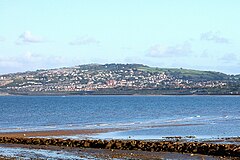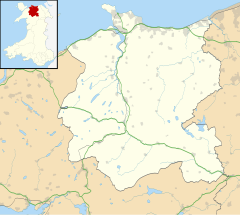Old Colwyn
Old Colwyn
|
|
|---|---|
 Old Colwyn seen from Rhos-on-Sea |
|
| Old Colwyn shown within Conwy | |
| Population | 8,113 (2011) |
| OS grid reference | SH864784 |
| Community |
|
| Principal area | |
| Ceremonial county | |
| Country | Wales |
| Sovereign state | United Kingdom |
| Post town | COLWYN BAY |
| Postcode district | LL29 |
| Dialling code | 01492 |
| Police | North Wales |
| Fire | North Wales |
| Ambulance | Welsh |
| EU Parliament | Wales |
| UK Parliament | |
| Welsh Assembly | |
Old Colwyn (Welsh Hen Golwyn), is a town just to the east of Colwyn Bay, in Conwy County Borough, Wales.
Prior to local government reorganisation in April 1974 it was part of the Municipal Borough of Colwyn Bay, but the reorganisation established it as a separate community, whose population at the 2001 census was 7,626, increasing to 8,113 at the 2011 census. It hosted the National Eisteddfod in 1941. It also harbours the 3rd Colwyn Bay (Old Colwyn) Scout Group headquarters and is home to the area's comprehensive school, Ysgol Bryn Elian
In Old Colwyn is an area of woodland called the 'Fairy Glen'. This area of woodland is said to contain many different spirits including fairies, hence its name, which dates from the Victorian era and is a common name from that period (e.g. the "Fairy Glen" in Penmaenmawr). This area has recently undergone a regeneration with funding from the council and it is now possible to walk through it easily. The Fairy Glen is subject to an ownership dispute between Conwy County Borough Council and the water company, Dŵr Cymru, each claiming that the maintenance of the area is the responsibility of the other.
Old Colwyn was once overlooked by the Hotel 70 Degrees, (just above Tan-y-Lan) so named because the architect who designed it used 70 degree angles in its construction. Built in 1972, it was demolished in 2007, to be replaced by a housing development. It also has easy access onto the promenade and beach, as well as a protruded cliff area known as Penmaenhead, marked by a disused stone utility house. This is a popular spot amongst teenagers for the dangerous practice of "cliff jumping" when tide is in and the water is deep enough, though to date nobody has been hurt.
...
Wikipedia

